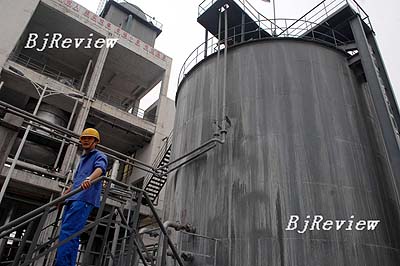|

Making Officials Accountable
On October 27, a vice mayor of Yueqing, east China's Zhejiang Province, apologized to local residents gathered at the town hall for faults made in the course of his work. The scene was broadcast live on local TV and the Internet and was seen as part of a campaign launched by the local legislative body to reform the way of exercising supervision over the government.
While it is widely known that the government must accept oversight from the people, in reality, the supervision is always ineffective. There are industrious efforts being made to explore ways through which to supervise government officials. For example, officials are asked to give their work report on TV and the public will then grade their work. However, the TV format prevents the public from questioning officials.
The event in Yueqing allowed the public to speak face-to-face with officials and even criticize the latter or challenge their work reports. Yueqing has set a good example by putting government officials in the public domain to face a strict examination of their duties.
It is better that Yueqing's model will be used extensively around the country, and that the public are not only consulted at the time of official appointments and promotions. Let the people know, ask and decide for themselves. This will greatly improve the country's supervision of those in positions of power.
Jinan Times
Put a Stop to Energy Handouts
China's revised Energy Conservation Law, adopted on October 28, stipulates that companies producing and trading in electricity, gas and other energy products are not allowed to provide these products for their employees free of charge. The revision of the law is progressive to some extent, but why does it ban only free supplies but not "cheap" supplies? After all, it's quite possible that energy enterprises will offer low-priced products to their employees, something that is known as "welfare corruption."
Free energy use inevitably leads to a waste. Only when the consumption affects the pocket of users, can they develop the awareness needed to promote energy conservation.
Actually, even if employees in monopoly energy enterprises are charged for energy use, they are very likely to be compensated in the form of "subsidies," making the legal stipulations ineffectual.
To eradicate "welfare corruption," we need to smash industrial monopolies and encourage market competition. When faced with fierce market competition monopoly industries will be forced to give up "welfare corruption." This is also a way to improve the effectiveness of the law.
Sanqin Metropolis Daily
Income Tax Threshold Too Low
According to a recent poll involving 3,700 interviewees, 97 percent of them believe that the current cutoff point of 1,600 yuan for personal income tax should be raised. Given the present living cost in big cities like Beijing, Shanghai and Guangzhou, a monthly income of 1,600 yuan can only ensure a basic living standard there. If a family of three earns a total of 1,600 yuan a month, then the family must be living under the poverty line. It is therefore obvious that this cutoff point will make ordinary people's daily life very difficult.
Actually, after years of rapid development, China's gross domestic product and fiscal revenue are growing at above 10 percent annually. In 2006, the central government revenue was about 2.05 trillion yuan (more than $273 billion). Based on this, the state can fully afford to lift the cutoff point of personal income tax. This is actually another way of returning wealth to the people.
It's also necessary to make regular adjustments to the personal income tax cutoff point, so as to make the collection of this tax more reasonable and flexible.
Guangzhou Daily
Name and Shame Them
Consumers International (CI) recently listed the world's four worst products in 2007. International giants such as Mattel and Coca-Cola, influential and powerful in business circles, were among winners of the dubious honors. The appearance on this list of shame is undoubtedly a heavy blow to these household names.
While gloating over these companies, Chinese are asking why China does not have its own "worst commodity list?" Since its establishment, the China Consumers' Association (CCA) has done a lot in the interests of consumers. In the case of "the worst commodity list," although CCA's can't meaningfully punish offenders, it's not a difficult job to conduct a poll among the public. After all, the impact of carrying out such a survey across the country will be powerful and it will be an effective way to improve commodity quality in China.
As a non-profit organization, CI has the nerve to point the gun at big companies, something CCA could learn from, especially as this kind of exposure benefits consumers, rather than helping companies gather great profits.
Market News | 